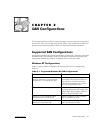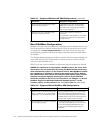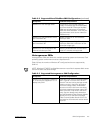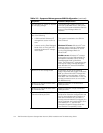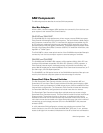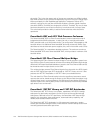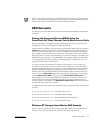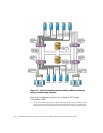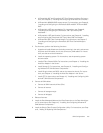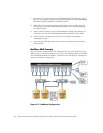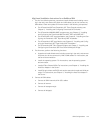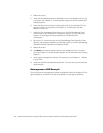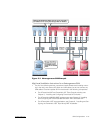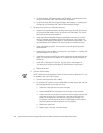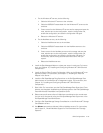
support.dell.com SAN Configurations 2-7
DELL CONFIDENTIAL - Preliminary 3/16/00
(Rev. 11/3/98) FILE LOCATION:
S:\SYSTEMS\San\San2_0\I&T_Guide\English\91WYJ_A00\91WYJc20.fm
NOTE: In its current configuration, the PowerVault 130T Library and 120T Autoloader
are native SCSI devices requiring conversion to Fibre Channel for attachment to the
SAN through the PowerVault 35F Fibre Channel Multiport Bridge.
The following sections describe the various SAN storage consolidation configuration
examples.
- % .
"/ 0
Zoning is required in heterogeneous SAN configurations and may be used in other
configurations. Zoning uses World-Wide Names (WWNs).
You can obtain the WWNs of devices that are connected to each switch by using the
nsShow
command by using a Telnet or serial session. This command lists the con-
tents of the name server table in the switch. The WWNs are sorted by the physical
port number to which the devices are connected. (The position in the name server
table listing does not identify the physical port on which the device is connected.) The
WWN listing shows the port and node WWNs. This method of obtaining the WWNs
is recommended if the fabric contains only PowerVault 50F switches, but it can be
used for PowerVault 51F switches also.
In a fabric that has a PowerVault 51F switch (running version 2.1.x firmware), the
name server information for the entire fabric can be accessed from the Dell Power-
Vault Switch Manager application program by using a Web browser. Start the Switch
Manager application program by connecting to a PowerVault 51F switch through a
Web browser (see the Dell PowerVault Switch Manager User’s Guide for more infor-
mation). From the
Fabric View
page (the first page that is displayed in the browser),
click the
Name Server Table
button to launch the
Name Server Table View
. The
table displays the port and node WWNs of each device in the fabric, the switch to
which the device is connected (identified by domain id), and the physical port on
which the device is connected. The
Name Server Table
View
also identifies the zone
membership information for the device.
The WWN information can be used to identify the type of device that is connected to
a switch.
xx:xx:xx:60:69:xx:xx:xx
— PowerVault 5xF switch
xx:xx:xx:60:16:xx:xx:xx
— PowerVault 650F storage
xx:xx:xx:e0:8b:xx:xx:xx
— QLA2100/2200 Host Bus Adapter
xx:xx:xx:e0:02:xx:xx:xx
— PowerVault 35F Bridge
'/0
Figure 2-1 shows a Windows NT storage consolidation SAN with nine Windows NT
servers, two primary storage devices, and four backup storage devices.



